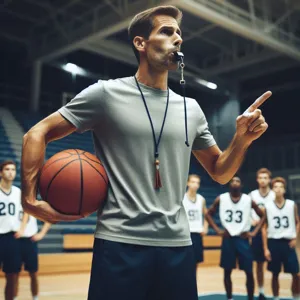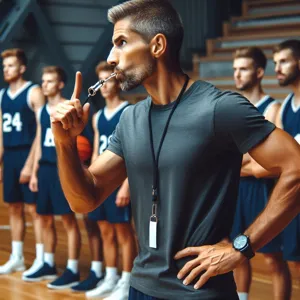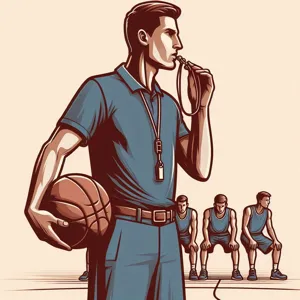In the dynamic world of basketball, the difference between a good team and a great one often lies in the hands of its coach.
An exceptional basketball coach possesses a unique blend of skills and qualities that not only inspire athletes but also elevate the entire team’s performance. From fostering a positive team culture to mastering the intricacies of strategy and game management, the role of a coach extends far beyond simply calling plays. In this blog post, we will explore the essential qualities that define outstanding basketball coaches, such as effective communication, adaptability, and a deep understanding of the game. Whether you’re an aspiring coach, a seasoned veteran, or a passionate player, understanding these qualities can provide invaluable insights into what it takes to cultivate success on and off the court. Join us as we dive into the winning edge that sets exceptional coaches apart and discover how these traits can transform a group of individuals into a cohesive and triumphant basketball team.
1. Introduction: The Role of a Basketball Coach

In the world of basketball, the role of a coach transcends the boundaries of strategy and gameplay; it is a multidimensional position that encompasses mentorship, leadership, and inspiration. An exceptional basketball coach is not just a figure standing on the sidelines, calling plays and managing substitutions. Instead, they are the heartbeat of the team, guiding athletes through the myriad challenges of the sport while fostering an environment where each player can thrive, both on and off the court.
At the heart of a coach’s responsibility lies the task of developing players’ skills—instilling fundamental techniques, honing tactical awareness, and cultivating physical fitness. However, the best coaches understand that the game is about more than just technical prowess. They recognize the importance of building a cohesive team dynamic, where trust and camaraderie flourish, empowering players to support one another in pursuit of a common goal. This requires not only a deep understanding of the sport itself but also a keen insight into the psychology of their athletes.
Moreover, a coach acts as a critical mentor, shaping the character and values of their players. They teach resilience in the face of defeat, the importance of hard work, and the significance of sportsmanship. By setting high standards and leading by example, a great coach inspires confidence and discipline, encouraging players to push their limits and strive for excellence. This dual role—both as a strategist and a mentor—defines the exceptional basketball coach and sets them apart in the fast-paced, competitive world of sports.
In this blog post, we will delve into the essential qualities that distinguish outstanding basketball coaches, exploring how their unique attributes not only contribute to their teams’ success but also leave a lasting impact on the lives of their players. Whether you are an aspiring coach, a seasoned veteran, or a passionate fan of the game, understanding these qualities can provide invaluable insights into the art of coaching and the profound influence it has on the sport of basketball.
2. Communication Skills: Building Trust and Understanding
Communication skills are the bedrock of effective coaching, transcending mere instruction to foster an environment of trust and understanding. An exceptional basketball coach doesn’t just talk; they listen, engage, and actively encourage dialogue among players. This two-way communication is vital for establishing rapport and ensuring that every team member feels valued and understood.
When a coach articulates strategies clearly, breaking down complex plays into digestible segments, players are more likely to absorb the information and execute it on the court. However, great communication goes beyond the tactical; it encompasses emotional intelligence as well. A coach who can read the room, recognizing when a player is struggling or needs encouragement, can tailor their messaging to motivate and uplift.
Regular check-ins with players, whether through one-on-one meetings or informal discussions, help to cultivate an atmosphere where players feel comfortable voicing concerns or asking for clarification. This open line of communication creates a sense of belonging, making players more invested not only in their personal growth but also in the team’s success.
Moreover, an exceptional coach knows the importance of non-verbal communication. Body language, eye contact, and tone of voice all convey messages that can inspire confidence or instill fear. A coach who maintains a calm demeanor during high-pressure moments reassures players, while enthusiastic gestures during a practice drill can ignite energy and excitement.
Ultimately, a coach’s ability to communicate effectively fosters a united team, where trust is built on understanding each player’s unique strengths and weaknesses. This trust is the cornerstone of a successful basketball program, enabling players to push their limits, collaborate seamlessly, and ultimately thrive under the guidance of an exceptional coach.
3. Leadership: Inspiring and Motivating Players

Leadership is the cornerstone of exceptional coaching, serving as the beacon that guides a team through the highs and lows of the basketball season. An exceptional basketball coach doesn’t just dictate plays; they inspire and motivate players to reach beyond their limits, fostering a culture of commitment and resilience.
The ability to inspire starts with a genuine passion for the game and an unwavering belief in each player’s potential. A great coach recognizes that every athlete is unique, with their own strengths, weaknesses, and motivations. By taking the time to understand these individual attributes, a coach can tailor their approach, delivering personalized encouragement that resonates deeply. This personal touch not only builds trust but also cultivates a sense of belonging within the team.
In practice, inspiring leadership manifests in various ways. It can be as simple as a well-timed word of encouragement during a tough drill, or as impactful as a heartfelt speech before a crucial game. Coaches who lead by example—showing up with dedication, work ethic, and integrity—set the tone for their players. They demonstrate that hard work on the court translates to success, not just in games but in life.
Moreover, exceptional coaches foster a positive environment where players feel safe to take risks and learn from mistakes. They instill a growth mindset, emphasizing that challenges are opportunities for improvement. This approach not only enhances individual performance but also cultivates a strong sense of teamwork, encouraging players to support one another through adversity.
Ultimately, the best coaches are those who ignite a fire within their players, pushing them to strive for greatness while reinforcing the values of teamwork, respect, and perseverance. When players feel inspired and motivated, they are not only more likely to achieve their personal best but are also more invested in the collective success of the team. In the end, a coach’s leadership can transform a group of talented individuals into a cohesive unit capable of extraordinary achievements on the court.
4. Knowledge of the Game: Strategies and Tactics
In the fast-paced world of basketball, a coach’s knowledge of the game is paramount. This extends far beyond just understanding the basic rules; it encompasses a deep comprehension of strategies and tactics that can make or break a team’s performance. An exceptional basketball coach must be well-versed in the nuances of offensive and defensive schemes, adapting their approach to the strengths and weaknesses of their players as well as their opponents.
Strategic thinking is crucial during games, where split-second decisions can lead to victory or defeat. An effective coach must analyze not just their own team’s capabilities but also the opposing team’s tendencies. This means being adept at developing game plans that capitalize on specific matchups while also being flexible enough to adjust in real time. For example, if an opposing team struggles against a particular defensive setup, a knowledgeable coach will exploit this weakness by implementing specialized defensive strategies, whether it be a zone defense to disrupt ball movement or a press to create turnovers.
Moreover, the tactical side of coaching involves understanding situational basketball. This includes managing the clock effectively, knowing when to call timeouts, and making substitutions that can provide a spark. Great coaches are often seen drawing up plays during critical moments, ensuring that their team is always prepared to execute under pressure.
Additionally, a coach’s knowledge of the game should extend to fostering a culture of continuous learning. By encouraging players to study game film, understand advanced statistics, and even educate themselves about the history of basketball, a coach instills a sense of respect for the game that can translate into improved performance on the court.
In essence, a profound knowledge of basketball strategies and tactics is what sets exceptional coaches apart. It empowers them to not only lead their teams with confidence but also to nurture a deeper appreciation for the sport among their players, ultimately cultivating a winning mindset that resonates throughout the entire organization.
5. Adaptability: Adjusting to Players’ Needs and Game Situations

Adaptability is a hallmark of an exceptional basketball coach, distinguishing the good from the great. In the fast-paced world of basketball, where game dynamics can shift in the blink of an eye, a coach’s ability to adjust strategies to meet the unique needs of players and the unfolding situations on the court is crucial for success.
A great coach recognizes that every player is different, with their own strengths, weaknesses, and learning styles. This requires a keen eye for detail and an empathetic approach; understanding when to push a player to excel and when to step back and provide support. For instance, if a player is struggling with confidence, a coach may choose to modify drills to focus on skill reinforcement rather than adding pressure. Conversely, when a player is on a hot streak, a coach’s adaptability shines through in their decision to leverage that momentum, perhaps by drawing up plays that allow that player to take more shots or handle the ball in crucial moments.
Adaptability extends beyond individual players; it encompasses the entire team dynamic and the ever-evolving nature of a game. A skilled coach will assess the flow of the game, identifying when to call a timeout to regroup or tweak the defensive alignment to counter an opponent’s strategy. For example, if the opposing team is excelling at perimeter shooting, an adaptable coach might switch to a tighter defense or employ a zone strategy to disrupt their rhythm.
Moreover, the best coaches are not just reactive but proactive, anticipating challenges and preparing their teams for diverse scenarios. This can involve adjusting practice plans based on upcoming opponents, incorporating different offensive sets, or preparing players for specific roles they may need to adopt in a given situation. An adaptable coach fosters a culture of flexibility within the team, encouraging players to embrace change and develop a mindset that thrives under pressure.
In essence, adaptability is about staying attuned to the pulse of the game and the needs of the players. It’s a quality that not only enhances a coach’s effectiveness but also empowers players to reach their fullest potential, making it an indispensable trait for any basketball coach aspiring to leave a lasting legacy.
6. Player Development: Fostering Skills and Growth
Player development is the cornerstone of an exceptional basketball coach’s philosophy. It transcends mere training; it embodies a commitment to nurturing each athlete’s unique talents while addressing their weaknesses. A great coach recognizes that every player is at a different stage of their development, and they tailor their coaching strategies accordingly.
This process begins with a comprehensive assessment of each player’s abilities. A skilled coach will sit down with their athletes, discussing their goals, aspirations, and areas for improvement. This open dialogue not only fosters trust but also empowers players to take ownership of their development. By setting personalized objectives, coaches can create a roadmap that guides each player’s growth throughout the season.
Effective drills and practice sessions are vital components of player development. A competent coach incorporates a variety of training techniques that challenge players both physically and mentally. From skill-specific drills focusing on shooting, dribbling, and defensive strategies to conditioning exercises that enhance endurance and agility, each session should aim to push players to their limits while building their confidence. Moreover, incorporating game-like scenarios helps athletes understand how to apply their skills in real-time situations, preparing them for the competitive nature of actual games.
However, a focus on technical skills alone isn’t enough. Exceptional coaches also prioritize the mental and emotional aspects of the game. They instill a growth mindset in their players, teaching them resilience and the importance of learning from mistakes. Coaches who provide constructive feedback and celebrate small victories create an environment conducive to growth and self-improvement. This holistic approach not only develops better basketball players but also shapes well-rounded individuals who can thrive both on and off the court.
Finally, fostering a culture of teamwork and collaboration is vital to player development. Great coaches encourage players to support one another, recognizing that individual success contributes to the team’s overall performance. By cultivating strong relationships among teammates, a coach enhances communication on the court, which translates into better teamwork during games.
In summary, player development is a multifaceted approach that involves assessing individual abilities, implementing effective training regimens, nurturing mental resilience, and building team cohesion. An exceptional basketball coach who prioritizes these elements will not only elevate their players’ skills but also inspire a lifelong love for the game.
7. Emotional Intelligence: Understanding Team Dynamics

Emotional intelligence is the cornerstone of effective leadership, especially in the high-pressure environment of basketball coaching. An exceptional coach possesses the ability to read the emotional climate of their team, recognizing the subtle cues that indicate how players are feeling—be it confidence, frustration, or motivation. This sensitivity allows the coach to tailor their approach to meet the unique needs of each player, fostering a cohesive team dynamic.
Understanding team dynamics goes beyond just recognizing individual emotional states; it involves grasping the intricate web of relationships that exists within the group. A skilled coach can identify the strengths and weaknesses of each player, not only in terms of their skills on the court but also in how they interact with one another. This insight enables the coach to mediate conflicts, promote collaboration, and create a supportive environment where every player feels valued and understood.
Moreover, an emotionally intelligent coach knows when to push their players and when to provide a comforting presence. They can inspire trust and open lines of communication, encouraging players to express their thoughts and feelings without fear of judgment. This open dialogue not only strengthens individual relationships but also fosters a culture of unity and resilience within the team.
Ultimately, a coach equipped with emotional intelligence creates an atmosphere where players feel empowered to thrive, both as individuals and as a collective unit. By understanding and nurturing the emotional landscape of their team, they lay the groundwork for success that transcends the basketball court, teaching invaluable life skills along the way.
8. Discipline and Accountability: Setting Standards for Success
In the world of basketball, discipline and accountability are not just buzzwords; they are the cornerstones of every successful program. An exceptional coach understands that to cultivate a winning team, they must establish a culture of high standards and unwavering commitment. This begins with setting clear expectations for both behavior and performance, ensuring that every player knows what is required of them both on and off the court.
Discipline manifests in various ways—from the rigorous practice schedules that demand punctuality and effort, to the adherence to team rules that promote respect and teamwork. A disciplined coach leads by example, demonstrating a work ethic that players can admire and emulate. They create structured training sessions that emphasize skill development while instilling the importance of focus and determination.
Accountability goes hand in hand with discipline. An exceptional coach fosters an environment where players hold themselves and each other accountable for their actions. This means addressing mistakes openly, learning from them, and encouraging teammates to do the same. By creating a culture where accountability is embraced rather than feared, coaches empower players to take ownership of their performance, leading to both individual growth and collective success.
Moreover, a disciplined and accountable coach recognizes the importance of communication. They engage in regular check-ins with players, providing constructive feedback that helps them understand areas for improvement. This ongoing dialogue not only reinforces the standards set but also builds trust and respect within the team.
Ultimately, when discipline and accountability are prioritized, players develop not only as athletes but also as individuals. They learn invaluable life skills—like responsibility, resilience, and the importance of hard work—that extend beyond the basketball court. In this way, an exceptional coach not only drives their team to victory but also shapes the character of each player, setting them up for success in all aspects of life.
9. Team Culture: Creating a Positive and Inclusive Environment
Creating a positive and inclusive environment within a basketball team is not merely a managerial task; it’s a foundational quality that distinguishes exceptional coaches from the rest. A strong team culture fosters an atmosphere where players feel valued, respected, and empowered, allowing them to thrive both on and off the court.
An exceptional basketball coach understands that a cohesive team is built on trust and mutual respect. They actively promote open communication, encouraging players to express their thoughts and concerns without fear of judgment. By implementing regular team meetings where everyone’s voice is heard, the coach cultivates a sense of ownership among players. This inclusivity boosts morale and strengthens the bonds within the team, leading to a more unified approach during practices and games.
Additionally, a positive team culture emphasizes the importance of diversity and inclusion. Coaches should strive to create a welcoming environment for players of all backgrounds, recognizing that each individual brings unique strengths and perspectives to the table. Celebrating these differences not only enhances team dynamics but also fosters creativity in strategies and gameplay.
Moreover, an exceptional coach prioritizes the mental and emotional well-being of their players. They recognize that the pressures of competitive sports can take a toll on athletes, and thus, implement practices that promote a healthy balance between competition and camaraderie. By organizing team-building activities, facilitating mentorship programs, and providing resources for mental health support, they ensure that players feel both supported and connected.
In conclusion, a coach who actively shapes a positive and inclusive team culture lays the groundwork for success. By fostering trust, embracing diversity, and prioritizing well-being, they create an environment where players can flourish, ultimately translating into better performance on the court and a lasting love for the game.
10. Decision-Making: Analyzing Game Situations Effectively
In the fast-paced world of basketball, the ability to make quick and effective decisions can often be the difference between victory and defeat. Exceptional basketball coaches possess a keen understanding of the game, allowing them to analyze game situations with clarity and precision. This skill is not just about reacting to what unfolds on the court; it involves a deep comprehension of strategy, player dynamics, and the nuances of the opposing team.
When the clock is ticking down and the pressure mounts, the best coaches remain calm and collected, assessing their options with a level-headed approach. Whether it’s deciding when to call a timeout to regroup the team, choosing the right lineup to exploit a defensive weakness, or making the critical call for a last-minute play, their decision-making is informed by both instinct and experience.
Effective decision-making also extends beyond immediate game situations. Exceptional coaches study previous games, analyzing footage to understand what worked and what didn’t. They engage in discussions with their coaching staff and players, inviting insight and fostering an environment where collaborative thinking thrives. By doing this, they not only enhance their own knowledge but also empower their players to understand the intricacies of the game.
Ultimately, a coach’s ability to analyze game situations effectively ensures that their team is always prepared to adapt and overcome challenges on the court. This adaptability not only boosts team morale but also instills a sense of confidence in players, knowing they are guided by a coach who is adept at making the right calls when it matters most. In basketball, where every second counts, such decision-making prowess is indeed an invaluable quality that sets exceptional coaches apart from the rest.
11. Strong Work Ethic: Leading by Example
A strong work ethic is the bedrock of exceptional coaching, and it goes beyond mere dedication; it encompasses the relentless pursuit of excellence and the ability to inspire others to do the same. An exceptional basketball coach understands that their actions set the tone for the entire team, and they embody the principles of hard work, discipline, and resilience.
When a coach arrives early to practice, meticulously reviewing game footage, or staying late to work on their own skills, they send a powerful message to their players: commitment is crucial. This visible dedication encourages athletes to mirror that same enthusiasm and diligence in their own training. A coach who demonstrates a strong work ethic cultivates an environment where effort is not just expected but celebrated.
Moreover, these coaches excel in creating a culture of accountability. They challenge their players to push beyond their limits, encouraging them to embrace discomfort as a pathway to growth. Whether it’s through demanding rigorous practice sessions or emphasizing the importance of nutrition and fitness, a coach with a strong work ethic leads by example, instilling in their athletes the understanding that success is earned through sweat and perseverance.
Yet, a strong work ethic is not solely about intensity; it also reflects a balance of hard work and smart strategy. An exceptional coach is not afraid to adapt their methods, constantly seeking knowledge and new techniques to enhance their coaching approach. They stay informed about the latest trends in coaching, player development, and sports psychology, showcasing a commitment to lifelong learning.
In essence, a strong work ethic in coaching sets a powerful precedent that resonates throughout the team, fostering a collective spirit of determination and excellence. When players see their coach tirelessly pouring their heart into the game, they are more likely to mirror that commitment, ultimately leading to a more cohesive, motivated, and successful team.
12. Conflict Resolution: Managing Disagreements and Challenges
Conflict resolution is an indispensable quality that distinguishes exceptional basketball coaches from the rest. In the high-pressure environment of competitive sports, disagreements and challenges are bound to arise among players, coaching staff, and even parents. An exceptional coach not only recognizes this reality but also embraces it as an opportunity for growth and unity.
An effective basketball coach approaches conflicts with a calm demeanor and a constructive mindset. They foster an open atmosphere where players feel comfortable voicing their concerns or frustrations. By actively listening to all parties involved, a skilled coach ensures that everyone feels heard and respected, which is crucial for maintaining morale and team cohesion.
When managing disagreements, the best coaches employ a variety of strategies. They may facilitate team meetings to address issues collectively, encouraging players to express their viewpoints while promoting mutual respect. This collaborative approach not only resolves the immediate conflict but also teaches valuable lessons about teamwork and communication.
Moreover, exceptional coaches are adept at mediating disputes between players, often acting as a bridge to foster understanding. They help athletes see the bigger picture, emphasizing shared goals and the importance of unity on and off the court. By guiding players through their differences, coaches nurture resilience and adaptability—qualities that are essential not just in sports, but in life as well.
Challenges may also arise between coaches and parents, especially regarding playing time, strategy, or athlete development. A great coach navigates these conversations with professionalism and transparency, ensuring that parents feel informed and valued. They understand that building strong relationships with the families involved is just as important as cultivating a successful team.
In essence, conflict resolution is not merely about managing disagreements; it is about transforming potential discord into opportunities for learning and improvement. Coaches who master this skill create an environment where athletes thrive, fostering a culture of trust, respect, and collaboration that is foundational to any successful basketball program.
13. Continuous Learning: Staying Updated with Trends and Techniques
In the dynamic world of basketball, where strategies evolve and player skills constantly advance, the hallmark of an exceptional coach is a commitment to continuous learning. Staying updated with the latest trends and techniques is not merely advantageous; it is essential for fostering a competitive edge.
Great coaches understand that the game is in a constant state of flux. From offensive strategies like positionless basketball to defensive innovations like switching schemes, the nuances of the sport require coaches to embrace ongoing education. This can take many forms: attending coaching clinics, participating in webinars, or engaging in discussions with other coaches. Additionally, many successful coaches dedicate time to studying game footage—not just from their own teams but from around the league and across different levels of play. This practice helps them identify emerging trends, player development techniques, and effective in-game adjustments.
Moreover, continuous learning extends beyond just the tactical aspects of the game. Exceptional coaches also seek knowledge in psychology, nutrition, and physical training, understanding that coaching is as much about developing players holistically as it is about strategy. They may read books, subscribe to relevant publications, and follow thought leaders in the sports industry to ensure they are not left behind.
For a coach, the willingness to learn and adapt not only enhances their own skill set but also sets a powerful example for players. It fosters a culture of growth and curiosity within the team, encouraging athletes to take ownership of their development. Ultimately, a commitment to continuous learning creates an environment where both coaches and players can thrive, unlocking their full potential and driving the team towards success.
14. Building Relationships: Connecting with Players and Staff
Building relationships is at the heart of effective coaching, and it transcends mere strategy and skill development. An exceptional basketball coach understands that fostering strong connections with both players and staff is fundamental to creating a cohesive team environment. This relationship-building goes beyond the court; it requires genuine interest and investment in the individual lives of each team member.
A great coach takes the time to learn about their players’ backgrounds, aspirations, and challenges. By showing empathy and understanding, they create a safe space where players feel valued and heard, which is crucial for developing trust. This rapport encourages open communication, allowing players to express their concerns and ideas, which can lead to improved performance and morale.
Moreover, building relationships with assistant coaches and support staff is equally important. A collaborative atmosphere where everyone feels empowered not only enhances the team’s dynamics but also sets a positive example for the players. When staff members are included in decision-making processes and are treated as vital contributors, it fosters a sense of unity and shared purpose.
Regular team-building activities, whether on or off the court, can further strengthen these relationships. These moments allow players and staff to bond, creating lifelong memories that solidify their commitment to each other and the team’s goals. Ultimately, a coach who prioritizes relationships will cultivate a culture of respect and camaraderie, leading to a more resilient and successful basketball program.
15. Conclusion: The Impact of an Exceptional Coach on Team Success
The impact of an exceptional coach on team success cannot be overstated. A great coach serves as the cornerstone of a basketball team, influencing not only the players’ skills and strategies but also their morale and overall cohesion. It’s not just about drawing plays and analyzing game footage; it’s about fostering an environment where athletes feel valued and motivated.
Exceptional coaches have the unique ability to see potential where others might overlook it. They cultivate talent through personalized feedback and encouragement, helping players refine their strengths and address their weaknesses. This individualized attention creates a culture of growth and resilience, allowing athletes to flourish both on and off the court.
Moreover, an exceptional coach doesn’t just focus on winning games; they instill a sense of purpose and unity within the team. They understand that the best teams are built on trust and communication, and they prioritize relationship-building as a fundamental aspect of their coaching philosophy. By promoting teamwork and camaraderie, these coaches transform individual players into a cohesive unit capable of overcoming challenges and achieving greatness together.
In the end, the true measure of an exceptional coach is reflected in the successes of their players—both in the scoreboards and their personal development. As they guide their teams through the highs and lows of competition, they leave a lasting legacy that extends beyond the basketball court. Exceptional coaches not only shape athletes’ careers; they shape their lives, nurturing confidence, discipline, and a passion for the game that endures long after the final whistle blows.
In conclusion, the qualities of an exceptional basketball coach extend far beyond tactical expertise and game strategies; they encompass leadership, communication, adaptability, and a deep understanding of the game’s emotional nuances. By embodying these essential traits, a coach not only enhances team performance but also fosters an environment of trust and growth among players. As you reflect on the insights shared in this post, consider how these attributes can influence your coaching journey or your appreciation for the coaches who have shaped the players you admire. Whether you are a seasoned coach or an aspiring one, embracing these qualities will undoubtedly give you the winning edge necessary to inspire and lead your team to success on and off the court. Thank you for reading, and may your coaching journey be filled with passion, purpose, and victories!




